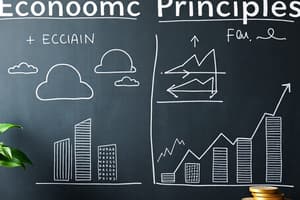Podcast
Questions and Answers
What is the primary focus of microeconomics?
What is the primary focus of microeconomics?
- Overall performance of the economy
- Global trade and investment
- Statistical analysis of economic data
- Behavior of individual economic agents (correct)
What does GDP measure?
What does GDP measure?
- Inflation rate of a currency
- Total income of a country
- Unemployment rate in an economy
- Total market value of final goods and services (correct)
Which economic concept describes the trade-off associated with limited resources?
Which economic concept describes the trade-off associated with limited resources?
- Equity
- Opportunity Cost (correct)
- Incentives
- Economic Efficiency
Which branch of economics examines trade and investment across national borders?
Which branch of economics examines trade and investment across national borders?
What does behavioral economics take into account when analyzing economic decisions?
What does behavioral economics take into account when analyzing economic decisions?
What happens during a period of inflation?
What happens during a period of inflation?
Which of these statements best describes economic efficiency?
Which of these statements best describes economic efficiency?
What is one key area that macroeconomics examines?
What is one key area that macroeconomics examines?
What defines a monopoly in market structures?
What defines a monopoly in market structures?
Which of the following characterizes a mixed economy?
Which of the following characterizes a mixed economy?
What role does the government play in addressing market failures?
What role does the government play in addressing market failures?
Which market structure is characterized by price makers?
Which market structure is characterized by price makers?
What is a key characteristic of monopolistic competition?
What is a key characteristic of monopolistic competition?
Which economic system prioritizes individual incentives and private ownership?
Which economic system prioritizes individual incentives and private ownership?
What can be a negative outcome of economic growth?
What can be a negative outcome of economic growth?
What is a defining characteristic of an oligopoly?
What is a defining characteristic of an oligopoly?
Flashcards
Microeconomics
Microeconomics
The study of how individuals and firms make decisions about resources and how these decisions influence markets.
Macroeconomics
Macroeconomics
The study of the economy as a whole, examining things like growth, inflation, and unemployment.
Scarcity
Scarcity
The limited availability of resources relative to unlimited wants and needs.
Opportunity Cost
Opportunity Cost
Signup and view all the flashcards
Supply and Demand
Supply and Demand
Signup and view all the flashcards
GDP (Gross Domestic Product)
GDP (Gross Domestic Product)
Signup and view all the flashcards
Inflation
Inflation
Signup and view all the flashcards
Unemployment
Unemployment
Signup and view all the flashcards
Perfect Competition
Perfect Competition
Signup and view all the flashcards
Monopoly
Monopoly
Signup and view all the flashcards
Monopolistic Competition
Monopolistic Competition
Signup and view all the flashcards
Oligopoly
Oligopoly
Signup and view all the flashcards
Capitalism
Capitalism
Signup and view all the flashcards
Socialism
Socialism
Signup and view all the flashcards
Mixed Economy
Mixed Economy
Signup and view all the flashcards
Public Goods
Public Goods
Signup and view all the flashcards
Study Notes
Branches of Economics
- Microeconomics studies individual economic agents like households and firms, focusing on supply, demand, market structures, and pricing.
- Macroeconomics examines the entire economy, including GDP, inflation, unemployment, fiscal, and monetary policy.
- Econometrics uses statistical methods to analyze economic data and test economic theories.
- Development economics focuses on economic growth and development in underdeveloped economies, considering poverty, inequality, and public policy.
- Behavioral economics incorporates psychology to understand economic decision-making, acknowledging that human behavior is not always rational.
- International economics studies trade, investment, and cross-national economic interactions, including exchange rates and finance.
Key Economic Concepts
- Scarcity: Limited resources versus unlimited wants, necessitating choice and opportunity cost.
- Supply and Demand: The interaction of desired quantities at different price points, leading to equilibrium.
- Opportunity Cost: The value of the next best alternative sacrificed in a decision.
- Incentives: Factors motivating individual and organizational actions. Economic theory assumes people respond to incentives.
- Efficiency: Maximizing output with available resources, minimizing waste and maximizing benefits.
- Equity: Fairness in resource distribution and economic outcomes. Often a goal in contrast with efficiency.
- GDP (Gross Domestic Product): The total market value of goods and services produced within a country's borders in a specific time frame.
- Inflation: The sustained increase in the general price level of goods and services.
- Unemployment: The percentage of the labor force actively seeking work but unable to find it.
Market Structures
- Perfect Competition: Many buyers and sellers, homogenous products, free entry/exit, price takers with zero long-run economic profit.
- Monopoly: One seller, unique product, high barriers to entry, price makers, potentially earning economic profit.
- Monopolistic Competition: Many sellers, differentiated products, some market power, slight barriers to entry.
- Oligopoly: A few large firms controlling a significant portion of the market, characterized by strategic interactions and interdependence.
Economic Systems
- Capitalism: Private ownership of production means, market resource allocation, individual incentives emphasized.
- Socialism: Collectivism, social ownership, central planning, greater emphasis on equity than efficiency.
- Mixed Economy: Combines elements of capitalism and socialism, integrating private and public ownership in resource allocation; common globally.
Role of Government in the Economy
- Providing public goods (national defense, street lighting) not efficiently provided by the private sector.
- Addressing market failures (externalities, information asymmetry) where markets don't allocate resources optimally.
- Redistributing income through taxes and welfare programs to reduce inequality.
- Regulating industries (controlling monopolies, protecting consumers, ensuring safety standards).
Economic Growth
- Factors contributing to economic growth include technological advancement, investment in human capital, and infrastructure improvements.
- Economic growth is often linked to rising living standards, labor productivity, efficient resource allocation, and innovation.
- Economic growth can have positive outcomes (wealth, employment) and negative outcomes (environmental concerns).
Studying That Suits You
Use AI to generate personalized quizzes and flashcards to suit your learning preferences.




